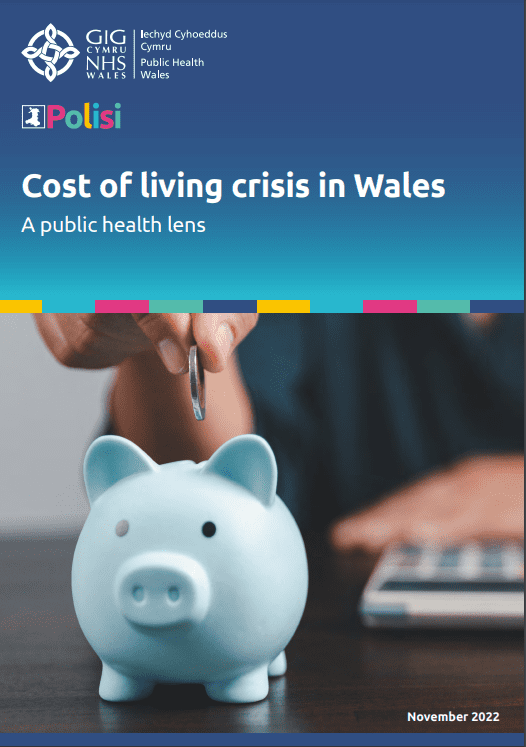A cost-of-living crisis is more than just an economic squeeze: it is a public health emergency.
A new report, from Public Health Wales, explores the cost-of-living crisis and unveils how not being able to afford the every day essentials, such as food, rent or mortgage payments, heating and hot water, has significant and wide-ranging negative impacts on mental and physical health.
What is the impact on public health?
Loss of income has a negative impact on health and wellbeing. But the cost-of-living crisis is more than this – energy, housing, food, and fuel costs, as well as the cost-of-borrowing, are all going up.
Such inflation is forcing people to make difficult choices, choices that affect people's health and wellbeing. Communities across Europe are deciding whether to heat homes or eat regular, healthy meals. People may feel unable to spend money on vital transportation needs to fulfil caring responsibilities or attend medical appointments and may not be able to keep up with rent or mortgage payments.
Stress and anxiety because of such choices take their toll on mental health and can increase health harming behaviours, such as smoking and drinking. On top of this are the specific impacts of living in cold, damp conditions, untreated medical conditions, or being malnourished, socially isolated, or made homeless.
Rising costs may also mean businesses close or make staff cutbacks, leading to job losses. This can negatively affect the health of individuals, their families, and communities. Community organisations and public services, including the NHS, are also seeing budgets go less far in the face of rising costs. This is making it harder for organisations to respond at the same time the cost-of-living crisis is worsening health and wellbeing.
How are health inequalities affected?
For some people in Wales, this cost-of-living crisis will be the first time finances have impeded on their health and wellbeing. For others it will feel all too familiar, as they are pushed closer to the brink. For those already living in poverty or struggling the most with their health, this latest crisis could be a matter of life and death.
In this way, the cost-of-living crisis will accelerate what were already increasing differences in health between those with more and less money. People living in the poorest parts of Wales already die more than six years earlier than those in the best-off areas. Certain groups are more at risk as they are more likely to be on low or insecure incomes or be unemployed, such as women, lone parents, and those with disabilities.
What does a public health response look like?
Within our report we make the case that the cost-of-living crisis is a public health emergency and requires an urgent public health response. Immediate action is needed to mitigate health harms, focusing on those hit hardest. This includes maximising income, mental health support, reducing fuel poverty and cold homes, preventing homelessness, promoting healthy eating, safeguarding, and working with employers and providers to support their staff and service-users.
A recent pilot in the Cwm Taf Morgannwg area shows how community engagement is key to mitigating some of the immediate impacts of the cost-of-living crisis. The pilot saw over 1,200 young people receive advice to maximise their income and feel more confident about dealing with money. Over half (57%) reported they were less stressed or worried about their financial problems, and 70% felt more confident in dealing with money worries.
But the negative impacts of the cost-of-living crisis – and the COVID-19 pandemic before that – are so significant because they push on the existing vulnerabilities of poverty and inequality. Therefore, the response must also tackle these underlying causes so that health and well-being are improved for all.
This means putting health and well-being considerations at the heart of all policy making that affects the building blocks for a healthy life, such as employment, education, the economy, housing, planning, and the environment – with a particular focus on ensuring every child has the best start in life.
Lessons learned, lessons shared
The legislative framework in Wales enables us to achieve this through the Well-being of Future Generations (Wales) Act 2015, the Public Health (Wales) Act 2017, and the Socio-economic Duty. Together these require the Welsh Government and public sector to make decisions that prioritise wellbeing.
The current cost-of-living crisis can and must provide the catalyst to accelerate progress on implementation. A healthier and more equal society is not only a better place to live but also one more resilient to the future challenges that no doubt lies ahead.

The Report
Click the link below to download the full report.



